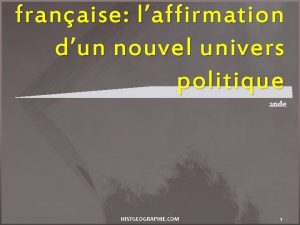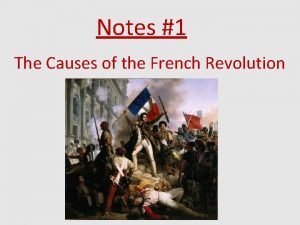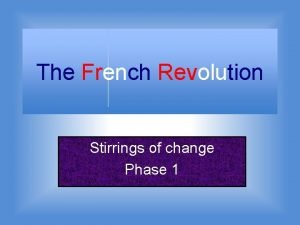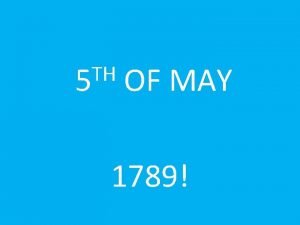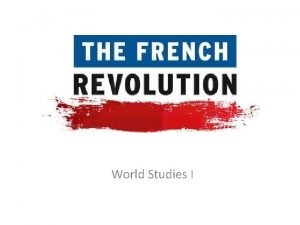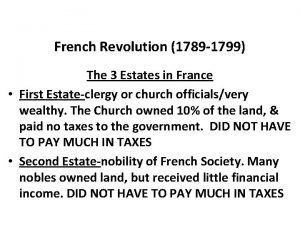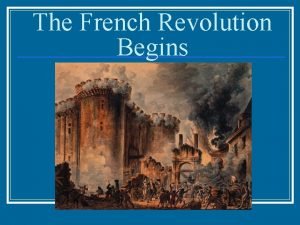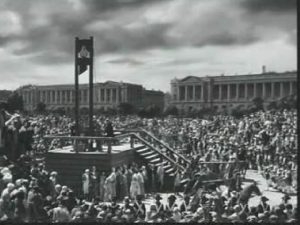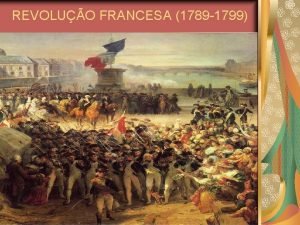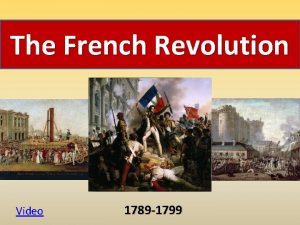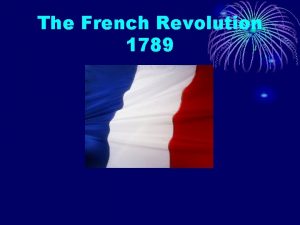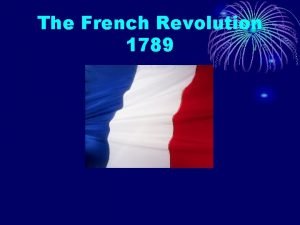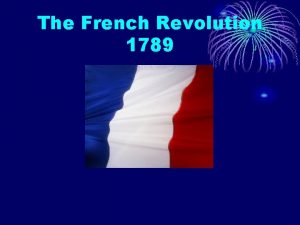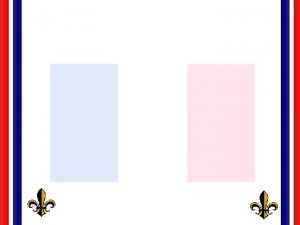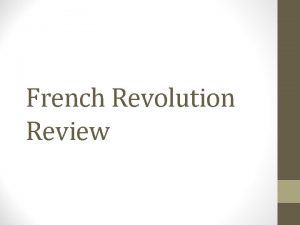French Revolution 1789 1799 The 3 Estates in










- Slides: 10

French Revolution (1789 -1799) The 3 Estates in France • First Estate-clergy or church officials/very wealthy. The Church owned 10% of the land, & paid no taxes to the government. DID NOT HAVE TO PAY MUCH IN TAXES • Second Estate-nobility of French Society. Many nobles owned land, but received little financial income. DID NOT HAVE TO PAY MUCH IN TAXES

• Third Estate-poorest & most diverse. Bourgeoisie (middle class) were top of 3 rd estate. --Bankers, merchants, manufactures, lawyers, & doctors. • Majority of 3 rd estate were rural peasants. • Urban workers: poorest & at bottom of 3 rd estate. Many were beggars/lived lives of crime • Low wages, had worst jobs, & paid highest taxes. • 1 st & 2 nd estate paid almost no taxes. • 3 rd Estate: 80%-90% of Population & NO VOICE IN GOVERNMENT

Causes of the French Revolution Economic Crisis • National Debit (wars, borrowing) Deficit Spending • Government spends more than it takes in Reform Failed • Failed • First and Second Estates refused to pay taxes

Grievances • Complaints by Estates & provinces Fairer taxes Freedom of the press Regular meetings of the Estates General Class resentment

The National Assembly • • King Louis calls 1 st Estates General since 1614 reps from all 3 estates/make reforms (May 5, 1789) 3 rd Estate demands all members get a vote in EG June 17 -- w/support from 1 st & 2 nd Estates-- 3 rd Estate declares itself to be the National Assembly --power to govern France June 20—Nat. Assembly goes to meeting hall at Versailles—it was locked--Louis, under pressure from nobles had ordered it closed

Tennis Court Oath • Locked themselves in a Tennis Court inside the Palace • The Tennis court Oath • They took an oath not to disband until they wrote a constitution • It was an act of defiance directed at the king and was a revolutionary step because it assumed power for a body that had no legal authority • June 23 the king met with the three estates and directed them to meet and deliberate individually. The Third estate refused to recognize the King

Storming of the Bastille-July 14, 1789 • The Bastille was a medieval fortress with walls 10 feet thick and 8 towers each one 100 feet high, represented years of abuse by the Monarchy • It was used as a political prison and was guarded by 80 retired soldiers and 30 Swiss mercenaries • People demand weapons that were “believed” to be stored there • Guards fired on the crowd , prisoners were eventually released • Bastille Day is now recognized as France’s Independence Day—start of the French Revolution

National Assembly-keeps power for a few years -1791: Adopts “Declaration of the Rights of Man & Citizen”-gives right to all 3 estates -turns France into Constitutional Monarchy -abolishes feudalism -all French citizens equal under law; women left out of this Revolution goes to Violence: Convention replaces National Assembly; France goes to war w/Austria & Prussia Reign of Terror begins: extremists control France - 1793: King Louis & wife are beheaded & replace monarchy w/republic - thousands are executed in France during this time: people feared citizens weren’t loyal to France -Moderates slowly retake France…this marks end of revolution in some eyes

Napoleon’s Reign (1799): -takes control bringing end to representative gov’t—rules as dictator -still retains citizens rights from revolution—uses Napoleonic Code which protects these rights -Crowns himself emperor BUT people supported this idea -He goes on to defeat much of Europe & expand the power of France -He helps to spread revolutionary ideas throughout Europe from the French Revolution---especially popular sovereignty & nationalism -People challenged monarchies & wanted republics—Result of the French Revolution

Nationalism—Major outcome of the French Revolution -common bond of a community with a cultural unity: language, history, customs, territorial boundaries -developing a political loyalty to the NATION (this develops after cultural nationalism) -sought unification and independence for nationalities -supported revolution: broke out in several areas of Europe in 1848—like Germany & Italy
 Louis xiv en costume de sacre symboles
Louis xiv en costume de sacre symboles 2nd estate
2nd estate The tennis court oath
The tennis court oath What was an immediate cause of the 1789 french revolution
What was an immediate cause of the 1789 french revolution 05.05.1789
05.05.1789 Three estates cartoon
Three estates cartoon Three estates of french revolution
Three estates of french revolution French revolution political cartoon
French revolution political cartoon The three estates of french revolution
The three estates of french revolution Russian revolution vs french revolution
Russian revolution vs french revolution You should hope that this game will be over soon
You should hope that this game will be over soon
